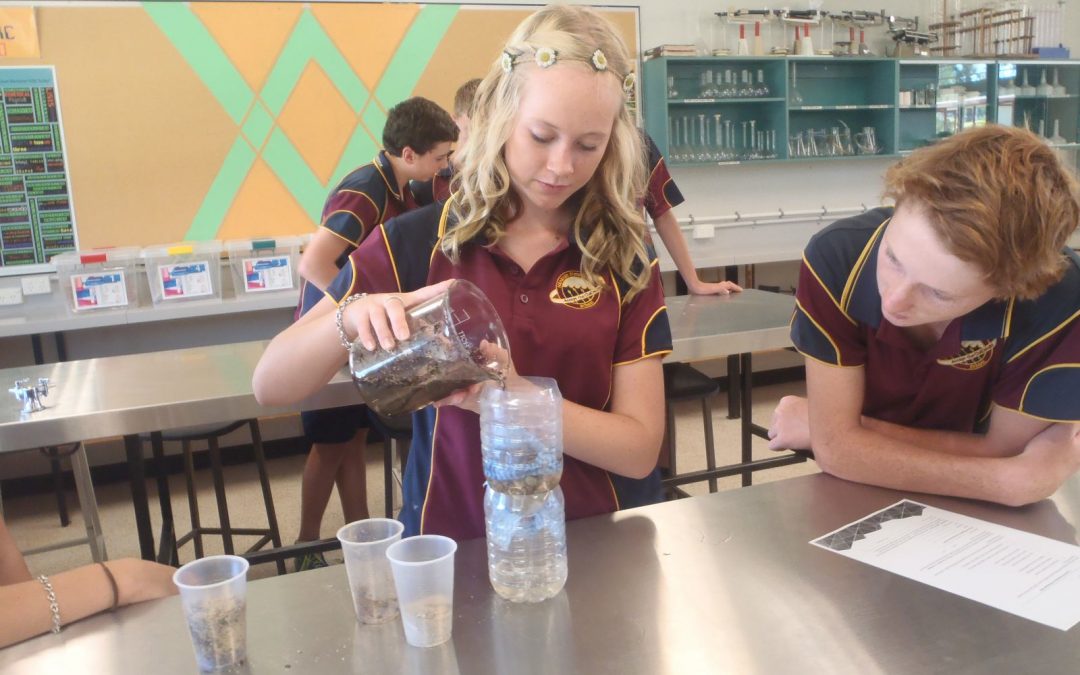“I want to break down stereotypes for boys and girls about what an engineer looks like and what they do,” explains Jenny Mackay, a chemical engineer at Origin Energy who takes time to volunteer with the EWB School Outreach program.
The EWB School Outreach programme promotes Science, Technology, Engineering & Mathematics (STEM) subjects to school children through fun interactive workshops that introduce kids to real world humanitarian challenges such as clean water access, and shows them how to use scientific principles to solve them. In 2016/2017 School Outreach initiatives led by role models like Jenny, reached 3,889 students – 55% of whom are female students – across 120 schools in rural and remote areas.
“I got involved to give young people some exposure to careers that may not be part of their day to day lives,” says Jenny “For example, they might regularly meet people working in teaching, nursing, or retail, but probably they don’t often meet people working as engineers.” And with women counting as 66% of those delivering School Outreach, EWB are very proud of the opportunity the program provides to showcase positive female role models working in STEM careers.
“We want to change the perception that STEM careers are only for boys good at maths, and that everyone working in STEM is ‘male, pale and stale’, says Emilie Nachtigalle, coordinator of EWB School Outreach. Indeed research has shown that children as young as three years learn stereotyped associations around gender and job roles (Hilliard & Liben 2010), and that six to nine year old girls hold implicit beliefs that maths and science are for boys, and that they are not as good at maths as boys. (Stefens, Jelenec & Noack 2010). “We want school kids to know that STEM is for anyone who likes problem solving and helping people,” she says “Moreover that working in STEM can be a source of empowerment; a means to build solutions for a world facing increasing global challenges.”
According to Emilie, there is growing demand from teachers in Australia for real-world based STEM content to use in their classrooms. The unique aspect of the EWB School Outreach program is that it is the only STEM program in Australia that focuses exclusively on ‘Humanitarian STEM’; using technical skills to solve humanitarian issues ranging from access to appropriate sanitation to clean energy. Solutions that help alleviate poverty, and address the Global Sustainable Development Goals to create a better world for everybody.
“This program has a double impact because school students see a different side of STEM, have a fun hands-on experience, and meet enthusiastic people who act as near to peer role models,” says Emilie. “Meanwhile volunteers connect with their communities and like-minded peers, develop their social conscience, and feel like they are giving back to the next generation.”
With its broad volunteer base and partnership model, EWB Australia has been able to bring these STEM workshops to rural, remote and regional schools that might otherwise struggle to access these resources. Moreover 12.2 % of students participating identified as Aboriginal or Torres Strait Islander or both.
Given the unique opportunity to engage Indigenous students, in 2016 EWB piloted a new type of school outreach incorporating traditional knowledge. In close partnership with a community in and around the Shepparton area of Victoria; including the Yorta Yorta Nation, and the Koorie Education Support Officers, new modules were developed that are closely aligned to the significant places and traditional knowledge of the Yorta Yorta culture. 40 volunteers especially trained in cultural awareness and best practices in Aboriginal education, have now delivered these workshops to over 30 schools in the region.
“This initiative is an important step toward reconciliation,” says Emilie. “It helps to create space in the STEM ecosystem for Aboriginal and Torres Strait Islander youth by valuing their traditional knowledge, supports the development of a culturally competent profession, and deepens non-Aboriginal Australia’s respect for the ancient wisdom that can support the work of STEM professionals.”
For Jenny, volunteering pays off in many ways. “I feel a small glowing happiness on the inside. I really enjoy seeing the confidence of school kids working together to tackle these problems in creative and agile ways. It can spark an idea, a change in outlook, or reshape the direction of someone’s life.”


